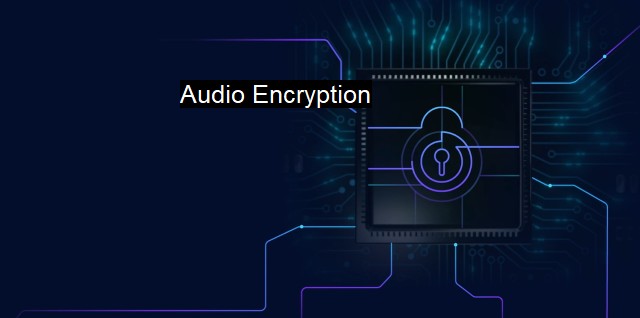What is Audio Encryption?
Protecting Sensitive Audio Information: Exploring the Importance of Audio Encryption and Cryptography in Cybersecurity
Audio encryption, a continually developing section of cybersecurity, is the process of transforming audible data into a format that cannot be understood by anyone except authorized parties. It has been leveraging the potential of cybersecurity to protect various kinds of audio information from intrusion, theft, or hijacking — concerns that are integral to the prospects of an interconnected world in the digital age.Audio encryption is perhaps most commonly associated with the safeguarding of confidential voice and video calls across various platforms. Its importance cannot be overstated, given the reliance on digital communication platforms for personal and professional purposes; spaces for which privacy and confidentiality are held dearly.
Fundamentally, audio encryption uses algorithms and ciphers to convert plain, understandable sound into encrypted data. The vital components involved in this process are the encryption key and the decryption key - the digital equivalents of a locked box and its corresponding key. The encryption key secures the original content by transforming it into an illegible pile of data, while the decryption key serves to reintroduce the original meaning, making it comprehensible to anyone, provided they have possession over the decryption key.
The straightforward concept of digital audio encryption doesn't underscore the complex processes involved in its real-world applications. In truth, the exact working of audio encryption not only varies significantly from one security platform to another but is also rooted intricately in sophisticated mathematics and computer science. Symmetric and asymmetric encryption are the two primary encryption sets. Symmetric encryption sees the identical key being used for both scrambling and unscrambling of messages. Asymmetric encryption, on the other hand, uses one key (public key) to encrypt the information, and a different one (private key), to decrypt.
When applied to cybersecurity, the significance of audio encryption multiplies. Cyber threats are increasingly complex and advanced, with encryption standing robust in safeguarding against eavesdroppers, hackers, and cybercriminals intending on intercepting lines of communication to gather sensitive information.
Due to increasing reliance on digital and remote communication, adequate cybersecurity measures such as audio encryption are critical to ensure state and corporate security. Be it video conference calls discussing critical business strategies or government meetings concerning national interest, encryption technology veils the information in a labyrinth of illegible data, rendering any attempt of unauthorized access futile.
Regarding antivirus systems, they enhance their reliability by the integration of audio encryption features. Vulnerabilities or threats existing in an audio format can be transformed into a strongly protected layer of data facilitated by encryption, helping to maintain constant vigilance against potential threats and prevent unauthorized access.
Developments in the Internet of Things (IoT) and advancements in artificial intelligence continue to drive the demand for secure audio encryption methods. Smart home devices relying on voice recognition, for instance, must be incorporated with encrypted voice command features, ensuring that no vulnerabilities expose sensitive data inadvertently.
Audio encryption plays an indispensable role within the larger cybersecurity repertoire. Not only does it ensure that various channels of communication are secure but also trust-building between users and digital platforms. As we move forward into an era dominated by digital communication and smart devices, audio encryption's role in perpetuating safe and secure information exchange is most likely to scale new pinnacles of relevance. As such, the study and understanding of audio encryption, its practices, and practicalities, are a much-needed skill in the rapidly evolving digital domain.

Audio Encryption FAQs
What is audio encryption?
Audio encryption is the process of encoding audio data in such a way that only authorized parties can access and play the audio files. The encryption algorithm converts the audio data into a coded format that can only be decoded using a specific key or password.Why is audio encryption important in cybersecurity?
Audio encryption is an essential component of cybersecurity because it helps protect sensitive audio data from unauthorized access, theft, and tampering. Encryption provides a high level of security that can help prevent cybercriminals from intercepting and accessing sensitive audio data.How does audio encryption work with antivirus software?
Audio encryption and antivirus software work together to protect audio files from malware infections. Antivirus software scans audio files for any viruses or malware and can also detect any attempts to decrypt or intercept encrypted audio files. Combining audio encryption and antivirus protection provides a comprehensive security solution for audio data.What are the benefits of using audio encryption?
The benefits of using audio encryption include enhanced security for sensitive audio data, protection against unauthorized access, improved regulatory compliance, and reduced risk of data breaches. Audio encryption also enables secure file sharing and collaboration by ensuring that only authorized parties can access the audio files.| | A | | | B | | | C | | | D | | | E | | | F | | | G | | | H | | | I | | | J | | | K | | | L | | | M | |
| | N | | | O | | | P | | | Q | | | R | | | S | | | T | | | U | | | V | | | W | | | X | | | Y | | | Z | |
| | 1 | | | 2 | | | 3 | | | 4 | | | 7 | | | 8 | | |||||||